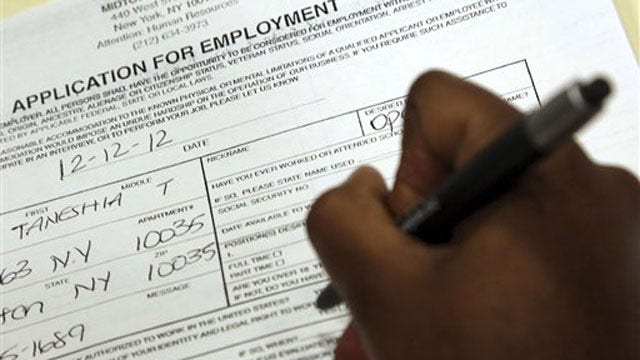Employers Add 155K Jobs in December
The December jobs report released Friday mirrored those from recent months, showing modest growth and solidifying the belief that the U.S. recovery will continue to be slow but steady into 2013.
The U.S. economy added 155,000 non-farm related jobs last month, right on target with forecasts, and the unemployment rate held steady at 7.8%. The numbers were close to the November figures, when 146,000 jobs were added.
Stocks rose modestly on the report.
“There were hopes that job growth would accelerate into the end of the year so today’s figure, again while inline, is probably disappointing to some,” said Dan Greenhaus, Chief Global Strategist at BTIG LLC in New York.
Greenhaus noted that “the underlying trend” of job growth in recent months has been about 150,000 jobs per month, and that the average rate of monthly job growth in 2012 was 153,000.
The unemployment rate is at its lowest point in four years, when the economy nearly collapsed amid a credit crisis in 2008 that pushed the U.S. into recession and eliminated more than 8 million jobs.
In a statistical twist, the headline 7.8% rate is considered unchanged from November due to a seasonal update conducted annually by the Labor Department. The number had previously been reported as 7.7%.
The Labor Department’s December report included upward revisions to nonfarm, manufacturing, and private-sector jobs in November. The revisions to October and November increased nonfarm payrolls by a combined 16,000.
Two areas of strength last month were manufacturing and construction. The construction sector added 30,000 jobs, the most in 15 months, fueled by a slowly recovering U.S. housing market. Manufacturing gained 25,000 jobs, the most in nine months.
Two factors that didn’t have as much impact as some had predicted were fallout from from Hurricane Sandy and the political wrangling over the so-called fiscal cliff, the tax hikes and budget cuts that would have kicked in Jan. 1 without the last-minute deal reached by Congress on New Year’s Day.
For months employers had said uncertainty primarily surrounding taxes was holding them back from hiring. But it wasn’t as big a detriment as some had forecast.
“One thing is crystal clear with the labor report, though: the doom-and-gloom scenarios discussed regarding the fiscal cliff seemed much more like science fiction than reality, at least for employers. Stocks should rise today as a result of the report," said Todd M. Schoenberger, a managing partner at LandColt Capital LP in New York.
That bodes well for people still looking for work because another Congressional battle over government spending is looming in February, when the U.S. will push up against its debt limit. If Congress doesn’t raise the limit the U.S. faces default and it could lead to a government shutdown, none of which benefits the broader economy.
But employers seem to be going about their business despite the shenanigans in Washington.
Consumer spending, which accounts for 70% of the economy, could take a hit in the coming months if Americans feel the impact from an increase in the payroll tax that took affect Jan. 1. The payroll tax, which is used to fund Social Security, was reduced by 2% in 2009 to put more money in consumers’ pockets during the worst of the recession. But Congress agreed to let the tax break expire as part of the fiscal cliff negotiations.
The December labor numbers don’t appear to be strong enough for the Federal Reserve to begin reining its easy money fiscal policies.
In September, with job growth stagnating, the Fed initiated another round of quantitative easing, or bond buying, in an effort to keep interest rates low and stimulate economic activity through increased borrowing and lending, specifically in the long-dormant housing market.
While the labor and housing numbers have approved somewhat through the fall, analyst say the recovery isn’t nearly strong enough for the Fed to start raising interest rates or rolling back its purchase of Treasuries.
Analysts at Nomura bank offered this assessment ahead of Friday morning's report: “The Federal Open Market Committee (FOMC) has tied further policy accommodation to the lack of a 'substantial' improvement in labor market conditions. A December jobs report in line with our expectations would not satisfy that condition. In response to the lack of 'substantial' improvement in labor market conditions, we expect the FOMC to continue its long-term asset purchases through the end of the third quarter of 2013.”




















